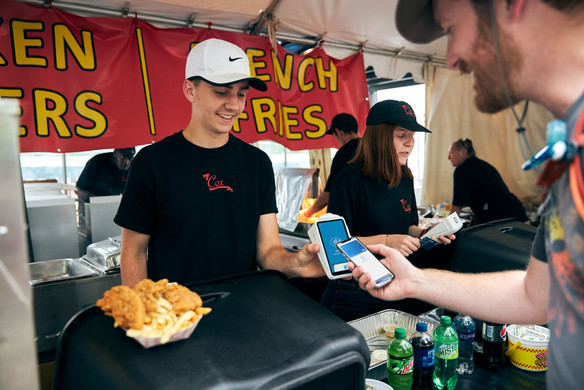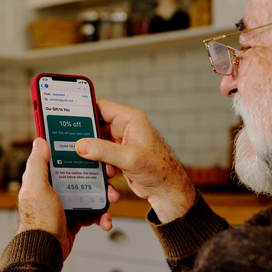Table of contents
Soon, fans that want to buy a hotdog at a major league stadium might need to leave their cash at home. Nearly all Major League Baseball ballparks went cash-free for the 2021 season and the trend doesn’t seem to be slowing down. Several National Football League (NFL) teams have announced cashless plans, as have some basketball and hockey stadiums.
The shift follows consumer transaction preferences, which are leaning away from cash and toward other forms of payments. With the right technology in place, businesses are realizing the benefits — from enhanced customer loyalty to increased operational efficiency.
A personalized experience
One of the most powerful benefits of going cashless is that it turns anonymous visitors into known fans. Using a system like Square can provide insight into purchases and habits which can help stadiums create personalized experiences to drive fan loyalty and form the foundation of a scalable and flexible data-first platform.
The omnichannel experience can start with the first customer interaction at the parking lot as stadiums collect their parking fees. The next stop on the buyer’s journey may be at a self-serve kiosk to order pregame snacks and beverages. Halftime may prompt a visit to the fan shop to grab team merchandise. The third quarter may include ordering a meal to be delivered seat-side, so the fan doesn’t have to miss a moment of the game waiting in line. Fans can also grab a beverage on the go from a seat vendor. And during key moments of the game, stadiums can send special offers to fans’ smartphones, such as prompting them to buy a jersey after an important score.
Each touchpoint gives stadiums a better understanding of fans and how they engage with the venue. The data can also generate insights that can drive strategies. For example, the information collected can improve the customer experience by sending targeted offers to the fan via a mobile app or through real-time social media marketing. And as fans leave the stadium, they can be given loyalty rewards redeemable on a future visit.
Cashless POS systems also collect information that can be used after the event. For example, stadiums can target all fans on Facebook who bought ice cream at a game last week with a “FREE ICE CREAM” discount at any event this week or month.
The COVID effect
The timing is right for going cashless, too. According to CPA Practice Advisor, global digital payments totaled about $4.7 trillion in 2019. COVID accelerated the trend as customers and stores encouraged contactless forms of payment, such as credit cards or digital wallets, to help mitigate the spread of the virus. As a result, digital transactions are expected to reach about $6.6 trillion in 2021. Square found that cashless business more than doubled in the U.S., Australia, Canada, and the UK between February 2020 and February 2021.
Consumers are embracing cashless transactions. A study from the Strawhecker Group found that 26% of consumers expect to use cash less frequently than they did before the pandemic. In fact, many consumers are afraid to touch cash due to the risk of germs. Instead, 27% expect to use credit and debit cards more often, while 34% will use their digital wallets. The movement away from cash could be here to stay. Seventy percent of consumers say they expect their shift to cashless payments will be permanent.
Of course, COVID impacted stadiums, too. During the pandemic live events were canceled or held without fans, greatly impacting stadium revenue. As management started planning the reopening process, going cashless made sense.
A shift to digital payments offers COVID-related benefits, such as reducing the fear of spreading the virus to employees through the handling of cash and coins. It also streamlines operations since cashiers don’t have to count money and provide change. Shifting to digital payments eliminates processing fees that banks charge for large cash deposits, and helps prevent loss from human error or theft.
Atlanta’s Mercedes-Benz Stadium went cashless in 2019 to speed up transactions and shorten wait times. As the first major stadium to go cash-free, it serves as a model for others who are making the shift during or post-COVID. In an interview with The Atlanta Journal-Constitution, Gordon Barfield, Director of Business Strategy, said converting to a cashless operation saved the stadium $350,000 in expenses by eliminating the costs that are associated with moving, counting, and securing large amounts of cash in the stadium.
The technology enabling cashless stadiums
Venues will still accept credit and debit cards and digital forms of payment, such as smartphones and smartwatches, and POS systems, such as Square Terminal, that accept near field communication (NFC) payments.
Larger venues, such as Mercedes-Benz Stadium, are installing “reverse ATMs,” where patrons can turn cash into prepaid debit cards with no transaction fee. The debit cards can be used within and outside of the stadium.
Many stadiums are adding self-serve kiosks or mobile-app ordering to their concession and retail businesses to further leverage the shift to digital. Real-time menu and availability updates can boost operational efficiency and get rid of long lines. Fans can place and pay for their order on a tablet or smartphone; then they can pick it up when it’s ready or have it delivered to their seats. This ease of ordering has boosted sales: Mercedes-Benz Stadium had a 16% increase in food and beverage sales when it went cash-free.
While going cashless reflects a global shift toward digital payments, it provides stadiums with opportunities to improve operations, build relationships with fans, and increase their business revenue. Engaging with consumers and providing a personalized experience has the potential to enhance fan loyalty — and that’s something everyone can cheer about.
![]()











